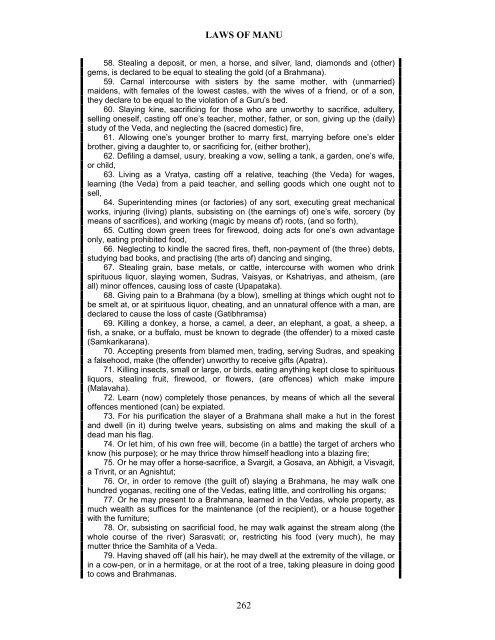Create successful ePaper yourself
Turn your PDF publications into a flip-book with our unique Google optimized e-Paper software.
LAWS OF MANU<br />
58. Stealing a deposit, or men, a horse, and silver, land, diamonds and (other)<br />
gems, is declared to be equal to stealing the gold (of a Brahmana).<br />
59. Carnal intercourse with sisters by the same mother, with (unmarried)<br />
maidens, with females of the lowest castes, with the wives of a friend, or of a son,<br />
they declare to be equal to the violation of a Guru’s bed.<br />
60. Slaying kine, sacrificing for those who are unworthy to sacrifice, adultery,<br />
selling oneself, casting off one’s teacher, mother, father, or son, giving up the (daily)<br />
study of the Veda, and neglecting the (sacred domestic) fire,<br />
61. Allowing one’s younger brother to marry first, marrying before one’s elder<br />
brother, giving a daughter to, or sacrificing for, (either brother),<br />
62. Defiling a damsel, usury, breaking a vow, selling a tank, a garden, one’s wife,<br />
or child,<br />
63. Living as a Vratya, casting off a relative, teaching (the Veda) for wages,<br />
learning (the Veda) from a paid teacher, and selling goods which one ought not to<br />
sell,<br />
64. Superintending mines (or factories) of any sort, executing great mechanical<br />
works, injuring (living) plants, subsisting on (the earnings of) one’s wife, sorcery (by<br />
means of sacrifices), and working (magic by means of) roots, (and so forth),<br />
65. Cutting down green trees for firewood, doing acts for one’s own advantage<br />
only, eating prohibited food,<br />
66. Neglecting to kindle the sacred fires, theft, non-payment of (the three) debts,<br />
studying bad books, and practising (the arts of) dancing and singing,<br />
67. Stealing grain, base metals, or cattle, intercourse with women who drink<br />
spirituous liquor, slaying women, Sudras, Vaisyas, or Kshatriyas, and atheism, (are<br />
all) minor offences, causing loss of caste (Upapataka).<br />
68. Giving pain to a Brahmana (by a blow), smelling at things which ought not to<br />
be smelt at, or at spirituous liquor, cheating, and an unnatural offence with a man, are<br />
declared to cause the loss of caste (Gatibhramsa)<br />
69. Killing a donkey, a horse, a camel, a deer, an elephant, a goat, a sheep, a<br />
fish, a snake, or a buffalo, must be known to degrade (the offender) to a mixed caste<br />
(Samkarikarana).<br />
70. Accepting presents from blamed men, trading, serving Sudras, and speaking<br />
a falsehood, make (the offender) unworthy to receive gifts (Apatra).<br />
71. Killing insects, small or large, or birds, eating anything kept close to spirituous<br />
liquors, stealing fruit, firewood, or flowers, (are offences) which make impure<br />
(Malavaha).<br />
72. Learn (now) completely those penances, by means of which all the several<br />
offences mentioned (can) be expiated.<br />
73. For his purification the slayer of a Brahmana shall make a hut in the forest<br />
and dwell (in it) during twelve years, subsisting on alms and making the skull of a<br />
dead man his flag.<br />
74. Or let him, of his own free will, become (in a battle) the target of archers who<br />
know (his purpose); or he may thrice throw himself headlong into a blazing fire;<br />
75. Or he may offer a horse-sacrifice, a Svargit, a Gosava, an Abhigit, a Visvagit,<br />
a Trivrit, or an Agnishtut;<br />
76. Or, in order to remove (the guilt of) slaying a Brahmana, he may walk one<br />
hundred yoganas, reciting one of the Vedas, eating little, and controlling his organs;<br />
77. Or he may present to a Brahmana, learned in the Vedas, whole property, as<br />
much wealth as suffices for the maintenance (of the recipient), or a house together<br />
with the furniture;<br />
78. Or, subsisting on sacrificial food, he may walk against the stream along (the<br />
whole course of the river) Sarasvati; or, restricting his food (very much), he may<br />
mutter thrice the Samhita of a Veda.<br />
79. Having shaved off (all his hair), he may dwell at the extremity of the village, or<br />
in a cow-pen, or in a hermitage, or at the root of a tree, taking pleasure in doing good<br />
to cows and Brahmanas.<br />
262


















